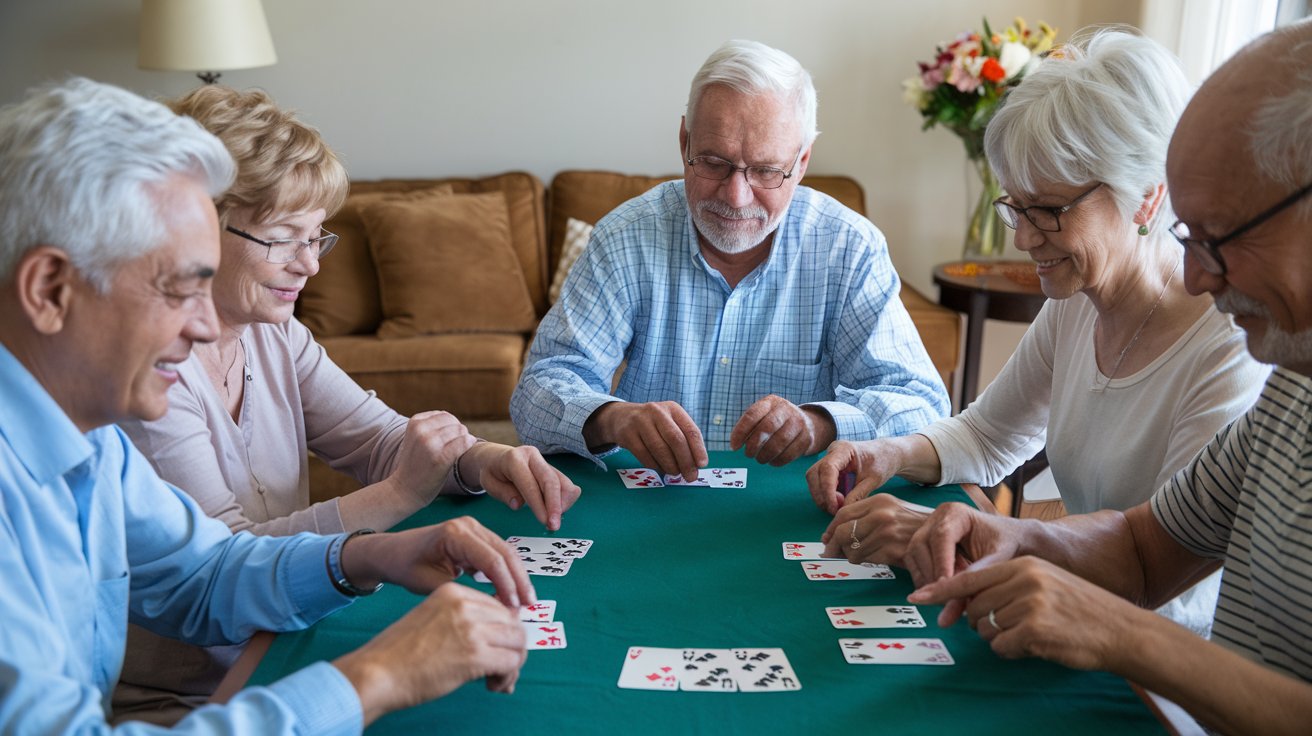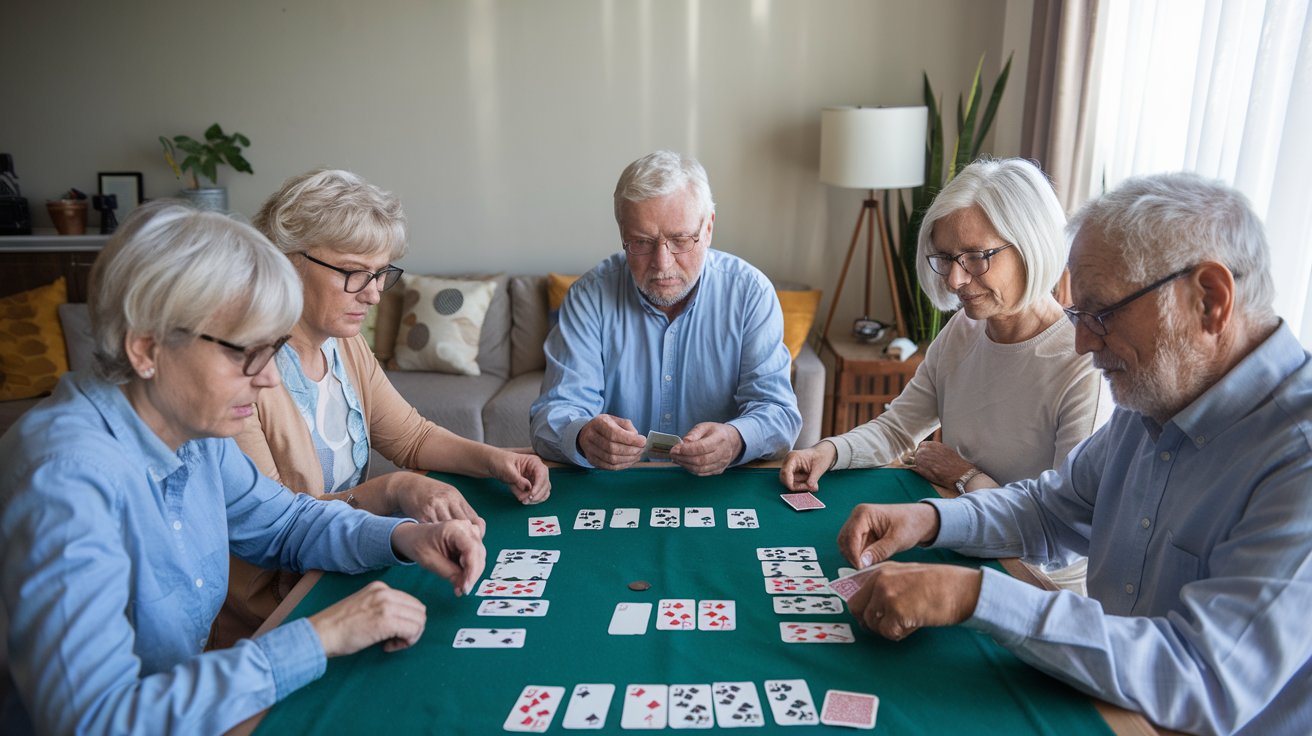There’s something magical about gathering around a table with a deck of cards, especially when it’s with elderly family members. Rummy, a classic card game that blends strategy, memory, and a touch of luck, is the perfect way to bridge generations, spark laughter, and create lasting memories. In 2025, as families seek meaningful ways to connect beyond screens, playing rummy with grandparents, aunts, or uncles offers a delightful mix of fun and bonding. But how do you make it enjoyable and accessible for older players who might face physical or cognitive challenges? In this 1500+ word guide, we’ll walk you through everything you need to know to play rummy with elderly family members—rules, adaptations, tips, and more. Let’s shuffle up and deal in some quality time!
Why Rummy Is Ideal for Elderly Family Members
Rummy isn’t just a game—it’s a social and mental workout wrapped in entertainment. For elderly players, it’s especially appealing because:
- Simple Yet Stimulating: The rules are easy to grasp, but the strategy keeps the mind sharp.
- Social Connection: It fosters conversation and closeness, combating loneliness.
- Low Physical Demand: No running or heavy lifting—just cards and a comfy seat.
- Nostalgia Factor: Many seniors grew up playing rummy, making it a trip down memory lane.
In April 2025, with wellness and family time trending, rummy stands out as a low-tech, high-impact activity. Plus, studies show card games can boost cognitive health in older adults, making it a win-win. Ready to get started? Here’s how to make it a hit with your elderly loved ones.
Step 1: Understand the Basics of Rummy

Before adapting the game, let’s cover the essentials. If your family member hasn’t played in years—or ever—a quick refresher sets the stage.
Objective
The goal is to form sets (three or four cards of the same rank, like three 7s) or runs (three or more consecutive cards of the same suit, like 4-5-6 of hearts) and lay them down until all your cards are melded.
Basic Rules
- Players: 2-6 (2-4 is ideal for a cozy family game).
- Deal: Each player gets 10 cards (or 13 in variants like Indian Rummy).
- Gameplay: Take turns drawing a card (from the deck or discard pile) and discarding one. The first to meld all their cards wins the round.
- Scoring: Unmelded cards count as points against you; aim for the lowest score over multiple rounds.
Keep it simple—focus on fun, not perfection. Now, let’s tailor it for elderly players.
Step 2: Adapt Rummy for Accessibility
Aging can bring challenges like reduced vision, shaky hands, or memory lapses. These tweaks ensure everyone can play comfortably.
Simplify the Rules
- Fewer Cards: Deal 7 cards instead of 10 or 13 to reduce complexity.
- Open Hands: Play with cards face-up on the table for a cooperative vibe—less pressure, more teamwork.
- Skip Scoring: Focus on finishing first rather than tallying points, unless they enjoy the math.
Accommodate Physical Needs
- Large-Print Cards: Use oversized or high-contrast decks (available online or at game stores) for better visibility.
- Card Holders: These nifty tools keep cards upright, sparing arthritic hands the strain of holding a fan.
- Bright Lighting: Set up in a well-lit room to ease eye strain.
- Comfy Seating: Cushioned chairs and a stable table make a big difference.
Support Cognitive Challenges
- Gentle Reminders: Recap whose turn it is or what a “set” means—no rush, no judgment.
- Team Play: Pair up with them to strategize together, turning it into a shared adventure.
- Short Rounds: Play one quick hand at a time, pausing for breaks as needed.
These adjustments keep the game inclusive without losing its charm.
Step 3: Set the Scene for Fun

The right atmosphere turns a card game into a cherished event. Here’s how to make it special.
Pick the Perfect Time
- Afternoon Delight: Early afternoons often work best—energy levels are higher, and it’s a nice break in the day.
- Avoid Fatigue: Keep sessions short (30-60 minutes) to match their stamina.
Create a Cozy Vibe
- Snacks and Drinks: Offer tea, cookies, or their favorite treats—nothing sticky that could mess up the cards!
- Music: Soft background tunes (think big band or classical) can evoke nostalgia without distracting.
- Memory Lane: Ask about their rummy stories from the past—did they play with siblings or at community halls?
Gather Supplies
- A standard 52-card deck (or two for larger groups).
- A table with plenty of space.
- Optional: A notepad for scores or a timer for rounds.
With the stage set, it’s time to play!
Step 4: Teach and Play Together
Introducing rummy to elderly family members—or refreshing their memory—is all about patience and encouragement. Here’s a step-by-step approach.
Start with a Demo
- Deal a practice hand and play it face-up, explaining each move: “I’m drawing a 5 of spades to finish my run—see, 3-4-5!”
- Point out sets and runs as they form, keeping it visual and hands-on.
Guide Without Overwhelming
- Offer hints like, “That 8 could go with your 6 and 7,” but let them decide.
- Celebrate small wins: “Great discard—that threw me off!”
Keep It Light
- Laugh off mistakes (yours included!) and focus on the joy of playing together.
- If they tire, suggest a break or wrap up with a “to be continued” promise.
A sample game might look like this:
- You deal 7 cards each to you and Grandma.
- She draws a card, discards a 10, and you nudge her toward a set of queens she’s building.
- After a few turns, she lays down three 4s, beaming with pride—victory!
Step 5: Add a Personal Touch
Make rummy a family tradition with these fun twists.
Family Rules
- Create quirky house rules, like “Draw two cards if you hum a tune” or “Wild cards are worth a hug.”
- Name a meld after them—call a run of hearts “Grandpa’s Lucky Streak.”
Storytelling Breaks
- Pause to hear their tales: “Did you ever win a big rummy game back in the day?”
- Share your own rummy flops or triumphs to keep the chat flowing.
Keepsakes
- Snap a photo of the game night or save a winning hand in a scrapbook—little mementos mean a lot.
These touches turn a simple game into a bonding ritual.
Benefits of Playing Rummy with the Elderly

Beyond the fun, rummy offers real perks for older players—and you.
Cognitive Boost
- Studies (like a 2022 report from Aging & Mental Health) show card games improve memory and focus in seniors.
- Spotting patterns and planning moves keeps their brain active.
Emotional Connection
- Shared laughter and teamwork reduce isolation—a big deal in 2025 as families prioritize togetherness.
- It’s a chance to listen, learn, and show you care.
Physical Engagement
- Handling cards and chatting keep hands and voices in motion, subtly supporting dexterity and speech.
For you, it’s a break from the digital grind and a way to honor their wisdom. Win or lose, everyone gains.
Tips for Success
- Be Patient: Moves might take longer—embrace the pace.
- Stay Flexible: If they tire or lose interest, switch to storytelling or a snack break.
- Encourage: Praise their efforts: “You’re a natural at this!”
- Mix It Up: Try variants like Gin Rummy or Rummy 500 if they’re up for a challenge.
- Involve Others: Invite siblings or cousins for a livelier group—more players, more memories.
Overcoming Common Challenges
- Hearing Issues: Speak clearly and face them; use gestures if needed.
- Vision Struggles: Double-check their cards with them—“Is that a 6 or a 9?”
- Memory Gaps: Gently remind them of the rules or their last move—no biggie.
With empathy and a smile, these hurdles melt away.
Why It’s Trending in 2025
As of April 2025, families are craving low-cost, high-connection activities. Rummy fits perfectly:
- Post-Digital Shift: People want real, tactile experiences after years of Zoom.
- Aging Population: More seniors are active and eager to engage.
- Wellness Focus: Mental and social health are priorities, and rummy delivers.
It’s a timeless game meeting a modern need—perfect timing for your next family night.
Conclusion: Deal In Some Love
Playing rummy with elderly family members isn’t just about cards—it’s about connection, care, and creating moments that linger. With a few adaptations, a warm setup, and a sprinkle of patience, you can turn a deck into a bridge across generations. In 2025, as we cherish time with loved ones more than ever, rummy offers a simple, joyful way to say, “I’m here with you.” So, grab those cards, sit down with your favorite senior, and let the good times roll. What’s your next rummy memory waiting to be made? Shuffle up and find out!

Zareb Saleh is a journalist at Gulf Today and a ghostwriter for Gameoholic, specializing in gaming, technology, and digital culture. With a keen eye for industry trends, he delivers insightful stories that engage and inform readers.




